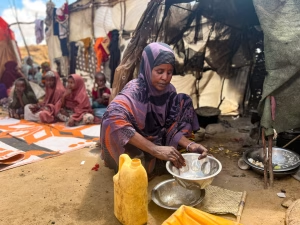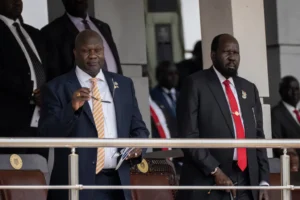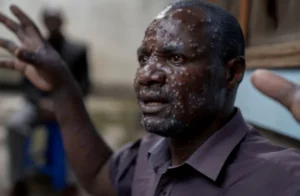Madagascar’s President, Andry Rajoelina, has reportedly fled the country, marking yet another government toppled by a wave of Gen Z-driven unrest spreading across the globe.
According to opposition leader Siteny Randrianasoloniaiko, Rajoelina left Madagascar on Sunday after sections of the army defected and joined protesters demanding his resignation. “We called the staff of the presidency and they confirmed that he left the country,” Randrianasoloniaiko told Reuters, adding that Rajoelina’s whereabouts remain unknown.
While the president’s office had earlier announced that he would address the nation on Monday evening, it has since gone silent. A military source revealed that Rajoelina departed aboard a French military aircraft, reportedly after striking a deal with French President Emmanuel Macron. French radio RFI corroborated the claim, citing that a French Army Casa aircraft departed from Sainte Marie airport shortly after a helicopter transferred the president aboard.
From Protests to Power Shift
The unrest began on September 25, sparked by widespread water and power shortages. However, it quickly escalated into a national uprising over corruption, poor governance, and economic hardship. Protesters—many from the younger generation—took to the streets demanding reform and leadership accountability.
The demonstrations mirror a broader global Gen Z revolt seen in other nations, including Nepal, where the prime minister resigned last month, and Morocco, which has witnessed similar youth-led discontent.
Rajoelina’s fall from power followed the defection of CAPSAT, an elite military unit that had once backed his 2009 coup. The unit declared over the weekend that it would no longer suppress the protesters and instead joined them, marching alongside thousands in the capital, Antananarivo. CAPSAT later announced it had taken control of the military and appointed a new army chief.
On Monday, the gendarmerie also aligned with the protesters, seizing control of its headquarters in a formal ceremony attended by senior officials. Meanwhile, the President of the Senate, a target of public anger, was dismissed, with Jean André Ndremanjary appointed as interim leader—a constitutional step toward transitional governance until elections are held.
The Voices of the Discontented
In the capital’s main square, chants of “The President Must Quit Now!” echoed through the crowd. Among the protesters was Adrianarivony Fanomegantsoa, a 22-year-old hotel worker earning just 300,000 ariary ($67) per month.
“In 16 years, the president and his government have done nothing except enrich themselves while the people stay poor,” he said. “And the youth, the Gen Z, suffer the most.”
At least 22 people have died in clashes between protesters and security forces since the demonstrations began, according to UN reports.
A Nation at a Crossroads
Home to 30 million people, three-quarters of Madagascar’s population lives in poverty, with a median age below 20. The World Bank notes that the country’s GDP per capita has fallen by 45% since independence in 1960. Despite its natural wealth—particularly as the world’s leading producer of vanilla, alongside exports of nickel, cobalt, textiles, and shrimp—widespread inequality continues to fuel discontent.
As Madagascar’s youth-led movement reshapes the nation’s political landscape, it underscores a growing global generational awakening, where young people across continents are demanding transparency, justice, and reform from aging political systems long resistant to change.











